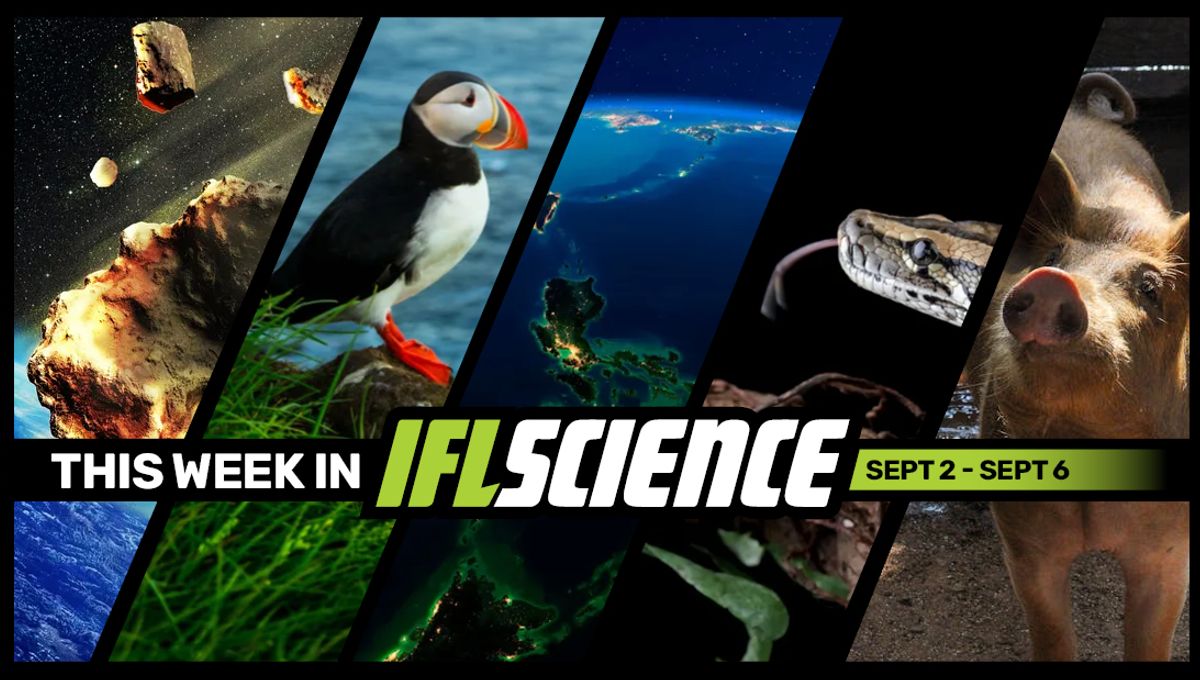
This week, the asteroid Apophis could be slightly more dangerous than first thought, people in Iceland are tossing baby puffins off cliffs, an asteroid impact in the Philippines makes history (and some great videos), a python in Bangladesh took two hours to ingest another python, and a pig in Hong Kong underwent surgery from a team 9,000 kilometers (5,592 miles) away. Finally, we take a closer look at the principles of homeopathy and explain why it’s not real science.
Subscribe to the IFLScience newsletter for all the biggest science news delivered straight to your inbox every Wednesday and Saturday.
The Chance Of Asteroid Apophis Hitting Earth May Be Slightly Higher Than We Thought
A new study looking at the potentially hazardous asteroid 99942 Apophis has suggested that the odds of an impact in 2029 or 2036 is ever so slightly higher than we thought. When it was first discovered, observations briefly placed it at the highest level of any object that has been discovered since NASA first started monitoring potentially hazardous Near-Earth Objects (NEOs). Read the full story here
Why Are People In Iceland Throwing Baby Puffins Off Cliffs?
Puffling season has returned to Iceland and with it comes a peculiar sight: humans tossing the baby birds off of cliffs. It sounds like cruelty but it’s a long-held tradition that helps these birds head in the right direction when they get confused by city lights. Read the full story here
Meteor That Burned Up Over Philippines Is Just Ninth Ever Detected Before Earth Impact
A small meteor about 1 meter (3 feet) in diameter burned up over Luzon Island in the Philippines this week. The celestial show was seen by many people, filmed, and photographed. That’s because, for only the ninth time ever, we were ready for it. Asteroid 2024 RW1 was observed before impacting Earth, meaning time and place of impact could actually be predicted. Read the full story here
In World-First, Burmese Python Is Found Eating Reticulated Python
In an image that’s sure to give you indigestion, a new paper has reported a world-first predation event as a Burmese python was spotted chowing down on a reticulated python. The Burmese was over 3 meters (10 feet) long with the tail-end of a reticulated in its mouth, in a rare meal that took about two hours to finish. Read the full story here
A Pig Just Had Surgery By A Team Operating 9,000 Kilometers Away
A pig in Hong Kong recently underwent an endoscopy with a twist – the person operating the endoscope was sitting in a lab 9,300 kilometers (5,779 miles) away in Zurich, Switzerland. Using the joysticks of a PlayStation controller, doctoral student Alexandre Mesot was able to manipulate the endoscope with only a 300-millisecond delay. Read the full story here
TWIS is published weekly on our Linkedin page, join us there for even more content.
Feature of the week:
How We Know Homeopathy Isn’t Real Science
Homeopathy: an alternative approach to healing, or the prototypical pseudoscience, depending on who you ask. It’s been around for over two centuries, and still has many devotees across the world. But by all empirical standards, homeopathy is simply not scientifically sound. Let’s unpack what homeopathy is, what people believe about it, and why we can be so sure it’s not real science. Read the full story here
More content:
Have you seen our e-magazine, CURIOUS? Issue 26 September 2024 is available now. This month we asked, “Should We All Be Journaling?” – check it out for exclusive interviews, book excerpts, long reads, and more.
PLUS, season 4 of IFLScience’s The Big Questions Podcast has begun. So far we’ve asked:
Source Link: Chance Of Asteroid Apophis Hitting Earth Slightly Higher Than Thought, Why Icelanders Are Tossing Puffins Off Cliffs, And Much More This Week